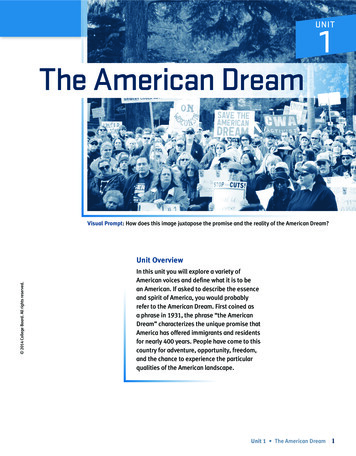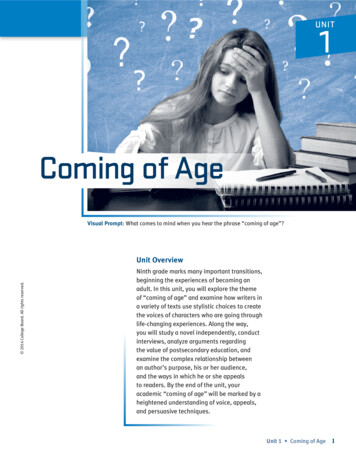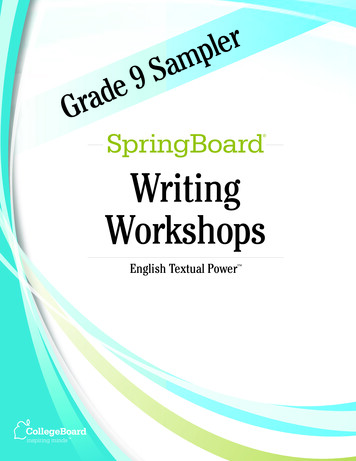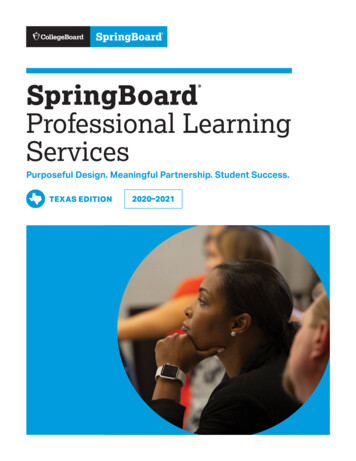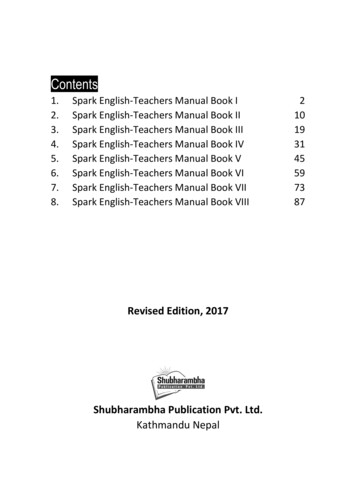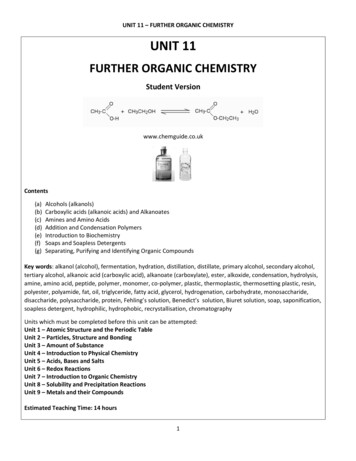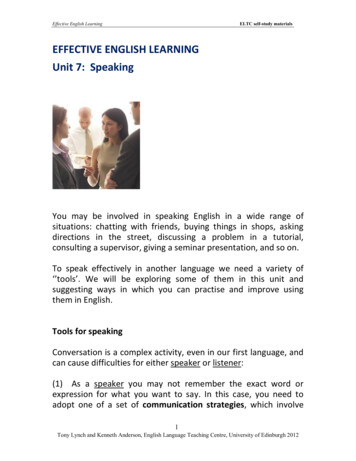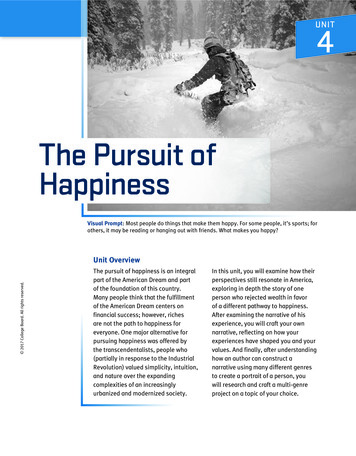
Transcription
UNIT4need hiresThe Pursuit ofHappinessVisual Prompt: Most people do things that make them happy. For some people, it’s sports; forothers, it may be reading or hanging out with friends. What makes you happy? 2017 College Board. All rights reserved.Unit OverviewThe pursuit of happiness is an integralpart of the American Dream and partof the foundation of this country.Many people think that the fulfillmentof the American Dream centers onfinancial success; however, richesare not the path to happiness foreveryone. One major alternative forpursuing happiness was offered bythe transcendentalists, people who(partially in response to the IndustrialRevolution) valued simplicity, intuition,and nature over the expandingcomplexities of an increasinglyurbanized and modernized society.In this unit, you will examine how theirperspectives still resonate in America,exploring in depth the story of oneperson who rejected wealth in favorof a different pathway to happiness.After examining the narrative of hisexperience, you will craft your ownnarrative, reflecting on how yourexperiences have shaped you and yourvalues. And finally, after understandinghow an author can construct anarrative using many different genresto create a portrait of a person, youwill research and craft a multi-genreproject on a topic of your choice.
The Pursuit of Happiness4GOALS:Contents To compose a personalessay that employs stylistictechniquesActivities4.1Previewing the Unit . 296 To analyze and evaluatethe structural and stylisticfeatures of texts4.2Searching for Meaning . 297Essay: from Self-Reliance, by Ralph Waldo EmersonEssay: “Where I Lived and What I Lived For,” from Walden,by Henry David Thoreau4.3Re-Searching for Meaning . 3074.4Another Transcendental View . 308Art: The Oxbow, by Thomas ColeArt: Kindred Spirits, by Asher Durand4.5Linking the Past to the Present . 311Poetry: “In the Depths of Solitude,” by Tupac ShakurPoetry: “Remember,” by Joy HarjoPoetry: “A Light Exists in Spring,” by Emily Dickinson4.6Drafting My Credo . 317Nonfiction: Credo from “All I Really Need to KnowI Learned in Kindergarten,” by Robert Fulghum4.7Revising My Credo . 3214.8Framing the Subject . 323Biography: “Author’s Note,”from Into the Wild, by Jon Krakauer4.9Meeting Christopher McCandless . 327*Biography: Into the Wild, by Jon Krakauer4.10Literary Connection . 330*Biography: Into the Wild, by Jon Krakauer4.11Shedding Light .332*Biography: Into the Wild, by Jon Krakauer4.12Meaning Through Structure . 334*Biography: Into the Wild, by Jon Krakauer4.13A Personal Perspective. 336Biography: Excerpt from Into the Wild, by Jon Krakauer To use a variety of genres toexpress a coherent themeACADEMIC VOCABULARYgenre conventionsLiterary rd English Language Arts Grade 11 2017 College Board. All rights reserved.UNIT
4.14A Personal Perspective on Style . 3424.15Reflecting on Life Experiences . 344Essay: “A View from Mount Ritter,” by Joseph T. O’Connor4.16Making Your Choice . 349 2017 College Board. All rights reserved.Embedded Assessment 1: Antithesis (4.2) Informal Spelling andUsage (4.5)Writing a Personal Essay .3514.17Previewing Embedded Assessment 2 and Style .353*Biography: Chapters 16–17 from Into the Wild,by Jon Krakauer4.18Searching for the Author .355*Biography: Chapter 18 from Into the Wild,by Jon Krakauer4.19Many Ways of Showing .357*Biography: Chapter 18 from Into the Wild,by Jon Krakauer4.20The Nuts and Bolts of the Multi-Genre Research Project . 360Multi-Genre Research Project: Student Sample4.21Exploring, Recording, and Imagining Research . 378Biographical Sketch: “Sparky,” by Earl Nightingale4.22Melding Facts, Interpretation, and Imagination . 382Article: “Charles M. Schulz Biography,”from Notable Biographies4.23Meeting in the Middle . 3874.24Thematic Threads to Create Flow . 3894.25Organizing the Multi-Genre Research Project . 391Embedded Assessment 2:Language and Writer’sCraftMY INDEPENDENTREADING LISTCreating a Multi-GenreResearch Project . 393*Texts not included in these materials.Unit 4 The Pursuit of Happiness295
ACTIVITY4.1Previewing the UnitLearning TargetsLEARNING STRATEGIES:Think-Pair-Share, CloseReading, Marking the Text,Summarizing, ParaphrasingMy Notes Identify and analyze the skills and knowledge necessary for success on theEmbedded Assessment.Making ConnectionsWhat does it mean to pursue happiness? Do we have a right to pursue happinessat all costs? In Into the Wild, a biography that investigates the life of ChrisMcCandless, a young man with an adventurous spirit, Jon Krakauer creates acompelling story.In telling the story, Krakauer uses multiple genres to illuminate the complex natureof McCandless’s character and pursuit of happiness. Using extensive primary andsecondary research, Krakauer presents McCandless’s quest for personal freedomand a personal relationship with nature that is part of the soul of American life. Asyou read and analyze Into the Wild, you will also evaluate your own beliefs andvalues associated with the pursuit of happiness.Essential QuestionsRespond to the questions based on your current knowledge.1. What does it mean to pursue happiness?2. How can a writer use/manipulate genre conventions for effect?Turn to the Contents page and look at the Academic Vocabulary and Literary Terms.Use your Reader/Writer Notebook to explore the meanings of these terms as youstudy this unit. What strategies and resources will you use to gather knowledgeof other new terms independently? How will you develop the ability to use themaccurately?Unpacking Embedded Assessment 1INDEPENDENTREADING LINKRead and DiscussFor independent readingduring this unit, read textsthat explore the pursuit ofhappiness or the searchfor self. You may read anautobiography, a biography,or a memoir. You could alsoread a collection of essays,short stories, or poemsthat explore this thematicconcept. Discuss possiblechoices with a group of peers.296Closely read the assignment for Embedded Assessment 1.Your assignment is to write and present a multi-paragraph reflective essayabout a significant personal experience that involves the pursuit of happinessand/or transcendental ideals, being sure to describe the experience andyour immediate response to it, as well as to reflect on the significance of theexperience.With your class, create a graphic representation of the skills and knowledge youmust have to complete the Embedded Assessment. It is important to keep the taskin mind as you work through the unit activities.SpringBoard English Language Arts Grade 11 2017 College Board. All rights reserved.Developing Vocabulary
Searching for MeaningACTIVITY4.2Learning Targets Develop a working definition of Transcendentalism and its key tenets. Analyze foundational works of American literature to identify philosophical tenets. Explain how the transcendentalists envisioned the pursuit of happiness.LEARNING STRATEGIES:Close Reading, Marking theText, Shared ReadingPreviewIn this activity, you will read excerpts from two of the foundational texts of theAmerican Transcendentalism movement, a literary and philosophical movementthat took root in New England in the 1820s and 1830s. The conversation that beganwith Ralph Waldo Emerson, Henry David Thoreau, Margaret Fuller, and otherscontinues to shape the way Americans think today.Transcendentalism asserts the existence of an ideal spiritual reality that transcendsthe empirical world and is knowable through intuition. As you read the followingexcerpts, you will discover key concepts and define the values that are central tothe transcendentalist perspective.My NotesSetting a Purpose for Reading Underline one sentence in each paragraph that seems to express the main ideaof the paragraph. Circle unknown words and phrases. Try to determine the meaning of the wordsby using context clues, word parts, or a dictionary. 2017 College Board. All rights reserved.ABOUT THE AUTHOREducated at Harvard University, Ralph Waldo Emerson was the chief founderof the Transcendentalist movement. Fueled by strong optimism and the beliefin the importance of the individual, Emerson helped to inspire social reformsin education, slavery, and the rights of women and Native Americans.Essay“fromSelf-Relianceby Ralph Waldo Emerson”1 There is a time in every man’s education when he arrives at the conviction that envyis ignorance; that imitation is suicide; that he must take himself for better, for worse, ashis portion; that though the wide universe is full of good, no kernel of nourishing corncan come to him but through his toil bestowed on that plot of ground which is givenhim to till. The power which resides in him is new in nature, and none but he knowswhat he can do, nor does he know until he has tried. 2 Society everywhere is in conspiracy against the manhood of every one of itsmembers. Society is a joint-stock company, in which the members agree, for the bettersecuring of his bread to each shareholder, to surrender the liberty and culture of theeater. The virtue in most request is conformity. Self-reliance is its aversion. It loves notrealities and creators, but names and customs.WORDCONNECTIONSRoots and AffixesConform is a word that means“to be similar to or the sameas something.” The prefix noncreates an opposing meaning.When used with the suffix -ist,meaning “a person who,” theresulting word, nonconformist,means “someone who doesnot behave in the same waysas others.” When the suffix -ityis added, the resulting word,conformity, refers to “the qualityor state of being the same asothers.”Unit 4 The Pursuit of Happiness297
ACTIVITY 4.2Searching for MeaningcontinuedGRAMMARUSAGEInfinitive PhrasesAn infinitive phrase beginswith an infinitive [to verb]and includes objects ormodifiers. For example,people often say, “to beperfectly honest,” or “towin her approval.” Infinitivephrases may also functionas nouns, adjectives, oradverbs. Emerson usesparallel infinitive phrasesto create a memorableline, “To be great is to bemisunderstood.” He usesinfinitive phrases as both thesubject [to be great] and asthe predicate nominative [tobe misunderstood].Write an original parallelinfinitive sentence using theframe: “To be is to be.”3 Whoso would be a man must be a nonconformist. He who would gather immortalpalms must not be hindered by the name of goodness, but must explore if it begoodness. Nothing is at last sacred but the integrity of your own mind. 4 A foolish consistency is the hobgoblin of little minds, adored by little statesmenand philosophers and divines. With consistency a great soul has simply nothing to do.He may as well concern himself with his shadow on the wall. Speak what you think nowin hard words, and tomorrow speak what tomorrow thinks in hard words again, thoughit contradict everything you said today. “Ah, so you shall be sure to be misunderstood.”Is it so bad, then, to be misunderstood? Pythogoras was misunderstood, and Socrates,and Jesus, and Luther, and Copernicus, and Galileo, and Newton, and every pure andwise spirit that ever took flesh. To be great is to be misunderstood. 5 The civilized man has built a coach, but has lost the use of his feet. He is supportedon crutches, but lacks so much support of muscle. He has got a fine Geneva watch, buthe has lost the skill to tell the hour by the sun. A Greenwich nautical almanac he has,and so, being sure of the information when he wants it, the man in the street does notknow a star in the sky. The solstice he does not observe; the equinox he knows as little;and the whole bright calendar of the year is without a dial in his mind. His notebooksimpair his memory; his libraries overload his wit; the insurance office increases thenumber of accidents; and it may be a question whether machinery does not encumber;whether we have not lost by refinement some energy, by a Christianity entrenched inestablishments and forms some vigor of wild virtue. For every Stoic was a Stoic; but inChristendom, where is the Christian?Second ReadGRAMMARUSAGEPunctuationThe semicolon is sometimesdescribed as stronger thana comma but weaker thana period. Most commonly,it is used between twoindependent clauses. Noticehow Emerson uses semicolonsto separate his ideas andstring together a series ofrelative clauses into a singlesentence. This techniqueforces the reader to slow thepace of reading and considereach idea.1. Key Ideas and Details: What central idea does Emerson establish through theanalogies in the first two paragraphs? What images does he contrast to conveythis idea?2. Key Ideas and Details: How does Emerson continue to develop the central ideain paragraph 3?Find a sentence in the essaythat features semicolons,and rewrite it using differentpunctuation. How does thechange affect the meaningand pace of the sentence?298SpringBoard English Language Arts Grade 11 2017 College Board. All rights reserved. Reread the essay to answer these text-dependent questions. Write any additional questions you have about the text in your Reader/WriterNotebook.
ACTIVITY 4.2continued3. Craft and Structure: What is Emerson’s criticism of consistency, as described inparagraph 4? How does Emerson’s use of this word relate to the central idea ofthe passage?My Notes4. Key Ideas and Details: How do Emerson’s examples in paragraph 4 furtherdevelop the central idea of the essay? 2017 College Board. All rights reserved.Writing to Sources: ArgumentChoose two or three lines from the “Self-Reliance” excerpt that state a strongopinion. Write a short argument essay in response to these lines, stating whetheror not you agree with them and how they compare or contrast with your ownbeliefs and experiences. Be sure to: Introduce a precise claim, distinguishing the claim and its significance fromEmerson’s views. Demonstrate your understanding of the text by pointing out the strengths orlimitations of Emerson’s claims. Develop your claim with relevant reasons and evidence from the text and yourown experiences.ABOUT THE AUTHORWell educated and brilliant, Henry David Thoreau defied expectations to livean uncommon life of reflection and simplicity. As an experiment to reconnectwith nature and discover the meaning of life, he lived for two years in a cabinin the woods of Massachusetts. He wrote about his experiences in Walden,one of the most well-known works in American literature.Unit 4 The Pursuit of Happiness299
ACTIVITY 4.2Searching for MeaningcontinuedEssayMy Notes“Where I Livedandfrom Waldenby Henry David Thoreausaturated: soakedexude: oozeWhat I Lived For”1 When first I took up my abode in the woods, that is, began to spend my nightsas well as days there, which by accident, was on Independence Day, or the Fourth ofJuly, 1845, my house was not finished for winter, but was merely a defense against therain, without plastering or chimney, the walls being of rough, weather-stained boards,with wide chinks, which made it cool at night. The upright white hewn studs andfreshly planed door and window casings gave it a clean and airy look, especially in themorning, when its timbers were saturated with dew, so that I fancied that by noonsome sweet gum would exude from them.requiem: a mass or a solemnceremony for a deceased personsomnolence: sleepiness3 Every morning was a cheerful invitation to make my life of equal simplicity, and Imay say innocence, with Nature herself. I have been as sincere a worshiper of Aurora3 asthe Greeks. I got up early and bathed in the pond; that was a religious exercise, and oneof the best things which I did. They say that characters were engraven on the bathingtub of King Tching-thang to this effect: “Renew thyself completely each day; do it again,and again, and forever again.” I can understand that. Morning brings back the heroicages. I was as much affected by the faint hum of a mosquito making its invisible andunimaginable tour through my apartment at earliest dawn, when I was sitting with doorand windows open, as I could be by any trumpet that ever sang of fame. It was Homer’srequiem; itself an Iliad and Odyssey in the air, singing its own wrath and wanderings.4There was something cosmical about it; a standing advertisement, till forbidden, of theeverlasting vigor and fertility of the world. The morning, which is the most memorableseason of the day, is the awakening hour. Then there is least somnolence in us; andfor an hour, at least, some part of us awakes which slumbers all the rest of the day andnight. After a partial cessation of his sensuous life, the soul of man, or its organs rather,are reinvigorated each day, and his Genius tries again what noble life it can make. Allmemorable events, I should say, transpire in morning time and in a morning atmosphere.The Vedas5 say, “All intelligences awake with the morning.” Poetry and art, and the fairestand most memorable of the actions of men, date from such an hour. All poets and heroes,like Memnon,6 are the children of Aurora, and emit their music at sunrise. To him whoseelastic and vigorous thought keeps pace with the sun, the day is a perpetual morning. It123456300Lincoln: small town in Massachusetts between Concord and SudburyConcord Battle Ground: reference to Emerson’s poem “Concord Hymn”Aurora: Greek goddess of dawnwrath and wanderings: Homer’s Iliad concerns the “wrath” of Achilles and the Odyssey tells ofthe “wanderings” of OdysseusVedas: collection of sacred Hindu literatureMemnon: In Greek mythology, the King of the Ethiopians whom Zeus made immortal.Memnon’s statue at Thebes was supposed to emit musical notes at dawn.SpringBoard English Language Arts Grade 11 2017 College Board. All rights reserved.2 I was seated by the shore of a small pond, about a mile and a half south of thevillage of Concord and somewhat higher than it, in the midst of an extensive woodbetween that town and Lincoln,1 and about two miles south of our only field known tofame, Concord Battle Ground;2 but I was so low in the woods that the opposite shore,half a mile off, like the rest, covered with wood, was my most distant horizon.
ACTIVITY 4.2continuedmatters not what the clocks say or the attitudes and labors of men. Morning is when I amawake and there is a dawn in me. Moral reform is the effort to throw off sleep. Why is itthat men give so poor an account of their day if they have not been slumbering? They arenot such poor calculators. If they had not been overcome with drowsiness, they wouldhave performed something. The millions are awake enough for physical labor; but onlyone in a million is awake enough for effective intellectual exertion, only one in a hundredmillions to a poetic or divine life. To be awake is to be alive. I have never yet met a manwho was quite awake. How could I have looked him in the face?4 We must learn to reawaken and keep ourselves awake, not by mechanical aids, butby an infinite expectation of the dawn, which does not forsake us in our soundest sleep.I know of no more encouraging fact than the unquestionable ability of man to elevatehis life by a conscious endeavor. It is something to be able to paint a particular picture,or to carve a statue, and so to make a few objects beautiful; but it is far more gloriousto carve and paint the very atmosphere and medium through which we look, whichmorally we can do. To affect the quality of the day, that is the highest of arts. Every manis tasked to make his life, even in its details, worthy of the contemplation of his mostelevated and critical hour. If we refused, or rather used up, such paltry information aswe get, the oracles would distinctly inform us how this might be done. 2017 College Board. All rights reserved.5 I went to the woods because I wished to live deliberately, to front only the essentialfacts of life, and see if I could not learn what it had to teach, and not, when I came to die,discover that I had not lived. I did not wish to live what was not life, living is so dear; nordid I wish to practice resignation, unless it was quite necessary. I wanted to live deep andsuck out all the marrow of life, to live so sturdily and Spartanlike 7 as to put to rout all thatwas not life, to cut a broad swath and shave close, to drive life into a corner, and reduceit to its lowest terms, and, if it proved to be mean, why then to get the whole and genuinemeanness of it, and publish its meanness to the world; or if it were sublime, to know it byexperience, and be able to give a true account of it in my next excursion. For most men,it appears to me, are in a strange uncertainty about it, whether it is of the devil or of God,and have somewhat hastily concluded that it is the chief end of man here to “glorify Godand enjoy him forever.”86 Still we live meanly, like ants; though the fable tells us that we were long ago changedinto men; like pygmies we fight with cranes; it is error upon error, and clout upon clout,and our best virtue has for its occasion a superfluous and evitable wretchedness. Ourlife is frittered away by detail. An honest man has hardly need to count more than histen fingers or in extreme cases he may add his ten toes, and lump the rest. Simplicity,simplicity, simplicity! I say, let your affairs be as two or three, and not a hundred ora thousand; instead of a million count half a dozen, and keep your accounts on yourthumbnail. In the midst of this chopping sea of civilized life such are the clouds andstorms and quicksands and thousand-and-one items to be allowed for, that a man has tolive, if he would not founder and go to the bottom and not make his port at all, by deadreckoning,9 and he must be a great calculator indeed who succeeds. Simplify, simplify.Instead of three meals a day, if it be necessary eat but one; instead of a hundred dishes,five; and reduce other things in proportion. Our life is like a German Confederacy,10made up of petty states, with its boundary forever fluctuating, so that even a Germancannot tell you how it is bounded at any moment. The nation itself, with all its so-called78910Spartanlike: The inhabitants of the ancient Greek city-state of Sparta were famed for theircourage, discipline, and frugality.“glorify forever”: from the Presbyterian book of beliefs: Westminister Shorter Catechismdead reckoning (n.): nautical term for a method of positioning a ship without using themore reliable method of astronomical observationGerman Confederacy: in 1815, the first ineffective alliance of German territoriesGRAMMARUSAGEHyperboleExaggerating an ideato emphasize a point issomething people often doin everyday conversations—consider “It hit me like a tonof bricks.” When writers usethis strategy in an essay tocreate an emotional responsein their audience, it is calledhyperbole. In Thoreau’s essay,notice the exaggeration heuses when he says that hedoes not want to discoverthat “ when I [come] to die, that I [have] not lived.”Thoreau does not mean hedoes not literally live his life,and readers understand he isexaggerating to make his pointabout living a “deliberate life.”Find another example ofhyperbole in the essay. Howit is intended to create anemotional response in thereader?sublime: elevated or loftyMy NotesWORDCONNECTIONSRoots and AffixesThe word inevitable has asits base the word evitable,which means “capable of beingavoided.” With the addition ofthe prefix in-, meaning “not,”the word inevitable means “notable to be avoided, or sure tohappen.”Unit 4 The Pursuit of Happiness301
ACTIVITY 4.2Searching for Meaningcontinuedsleepers: wooden beams to whichrailway tracks are rivetedGRAMMARUSAGEConditional SentencesConditional verbs such ascan/could and will/would areused to create conditionalsentences. They can be usedin past, present, or futuretense. Notice how Thoreauuses conditional verb tensesto suggest what would happenif a change were made: “Ifwe respected only what isinevitable music and poetrywould resound ” Here, theconditional mood is created bythe juxtaposition of the verbtenses.Annotate the first threeparagraphs for further usesof conditional verbs. Compareyour findings with those of apartner and discuss how eachexample creates a conditionalmood concerning the past,present, or future.internal improvements, which, by the way are all external and superficial, is just such anunwieldy and overgrown establishment, cluttered with furniture and tripped up by itsown traps, ruined by luxury and heedless expense, by want of calculation and a worthyaim, as the million households in the land; and the only cure for it, as for them, is in arigid economy, a stern and more than Spartan simplicity of life and elevation of purpose.It lives too fast. Men think that it is essential that the Nation have commerce, and exportice, and talk through a telegraph, and ride thirty miles an hour, without a doubt, whetherthey do or not; but whether we should live like baboons or like men, is a little uncertain.If we do not get out sleepers, and forge rails and devote days and nights to the work,but go to tinkering upon our lives to improve them, who will build railroads? And ifrailroads are not built, how shall we get to heaven in season? But if we stay at home andmind our business, who will want railroads? We do not ride on the railroad; it ridesupon us. Did you ever think what those sleepers are that underlie the railroad? Each oneis a man, an Irishman, or a Yankee man. The rails are laid on them, and they are coveredwith sand, and the cars run smoothly over them.7 For my part, I could easily do without the post office. I think that there are very fewimportant communications made through it. To speak critically, I never received morethan one or two letters in my life—I wrote this some years ago—that were worth thepostage. The penny post is, commonly, an institution through which you seriously offera man that penny for his thoughts which is so often safely offered in jest. And I am surethat I never read any memorable news in the newspaper. If we read of one man robbed,or murdered, or killed by accident, or one house burned, or one vessel wrecked, or onesteamboat blown up, or one cow run over on the Western Railroad, or one mad dogkilled, or one lot of grasshoppers in the winter—we never need read of another. One isenough. If you are acquainted with the principle, what do you care for myriad instancesand applications? To a philosopher all news as it is called, is gossip, and they who editand read it are old women over their tea. Yet not a few are greedy after this gossip. Therewas such a rush, as I hear, the other day at one of the offices to learn the foreign news bythe last arrival, that several large squares of plate glass belonging to the establishmentwere broken by the pressure—news which I seriously think a ready wit might write atwelvemonth, or twelve years, beforehand with sufficient accuracy. 8 Shams and delusions are esteemed for soundest truths, while reality is fabulous. Ifmen would steadily observe realities only, and not allow themselves to be deluded, life, tocompare it with such things as we know, would be like a fairy tale and the Arabian Nights’Entertainments. If we respected only what is inevitable and has a right to be, music andpoetry would resound along the streets. When we are unhurried and wise, we perceivethat only great and worthy things have any permanent and absolute existence, that pettyfears and petty pleasures are but the shadow of the reality. This is always exhilarating andsublime. By closing the eyes and slumbering, and consenting to be deceived by shows,men establish and confirm their daily life of routine and habit everywhere, which stillis built on purely illusory foundations. Children, who play life, discern its true law andrelations more clearly than men, who fail to live it worthily, but who think that they arewiser by experience, that is, by failure. 9 Time is but the stream I go-a-fishing in. I drink at it; but while I drink I see thesandy bottom and detect how shallow it is. Its thin current slides away, but eternityremains. I would drink deeper; fish in the sky, whose bottom is pebbly with stars.I cannot count one. I know not the first letter of the alphabet. I have always beenregretting that I was not as wise as the day I was born. The intellect is a cleaver; itdiscerns and rifts its way into the secret of things. I do not wish to be any more busywith my hands than is necessary. My head is hands and feet. I feel all my best facultiesconcentrated in it. My instinct tells me that my head is an organ for burrowing, as some302SpringBoard English Language Arts Grade 11 2017 College Board. All rights reserved.My Notes
ACTIVITY 4.2continuedcreatures use their snout and forepaws, and with it I would mine and burrow my waythrough these hi
3 Whoso would be a man must be a nonconformist.He who would gather immortal palms must not be hindered by the name of goodness, but must explore if it be goodness. Nothin
